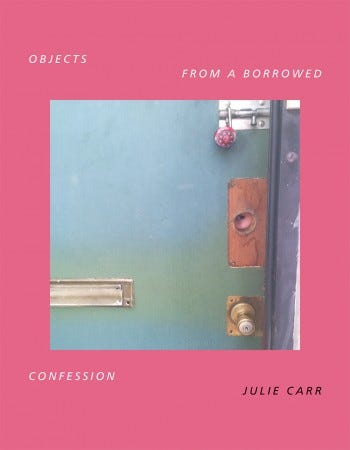from A river runs through it: a writing diary
, collaborating with Julie Carr
To co-respond, as with more direct collaboration, is to enter into conversation with the other writer’s work. There is a darkness in Carr’s work I’ve seen throughout her published work, one that exists not in isolation, but as part of a much larger canvas. Carr doesn’t shy away from violence, trauma or grief, including such as an element that requires acknowledgment and examination.
Her Objects from a Borrowed Confession (2017) explores the form and arguments of confession, the intimate and “confessional poetry.” Through a blend of forms, she weaves poetry, memoir and critical prose to compose a lyric essay on the very nature of confession itself, as she writes to open the “Author Statement” that accompanies the press release:
The works in Objects from a Borrowed Confession have been written over a stretch of approximately ten years, in and around the writing of various other books of poetry and prose. They all share a common obsession with the theme of confession. I became interested in this theme partially because the term “confessional poetry” carried such negative connotations when I was “coming up” in poetry, even as poets considered “confessional,” especially Sylvia Plath and Adrienne Rich, had been so important to me as a young writer. The situation was similar to being a hard-core punk kid while sometimes listening to Joni Mitchell in my bedroom. I wanted to think about what the Language Poets and the Conceptual Poets had against “confession,” but I also wanted to see why confession was so important to our broader culture. Obviously, in the age of Facebook and the memoir, everyone is a confessional poet, and I wanted to explore that impulse and the attraction we have to one another’s secrets. On a more philosophical level, I wanted to understand what the act of confession has to do with intimacy, empathy and subjectivity.
Through ten sections, this book exists as a curious meeting point between the works of New York poet Rachel Zucker and non-fiction writer Sarah Manguso, composing a conversation illuminating what it is about “confession” that seems so frightening, and easy to dismiss by both writers and readers alike. Ten years in the making and thick as a thesis, Carr’s lyric is perfectly timed, given the shifts in memoir-writing, non-fiction and, quite pointedly, the “confession,” via writers such as Manguso and Maggie Nelson. In comparison, Objects from a Borrowed Confession retains a strong foothold in poetry, and might even be better to compare to Jasmine Dreame Wagner’s quite remarkable On a clear day (2017), or even works by Sue Landers or Susan Howe. As Carr writes: “I confess here and now to liking the shape of my own lips as they enact / the future of feeling on a minor scale my focus as narrow as my ambition is grand but these are / ideas we have encountered before so perhaps it’s time to alter my font?”
A year later, Carr released Real Life: An Installation (2018), a book that moves the contemporary lyric as part critical diary and part theatrical script wrapped up in the minutae of the domestic prose poem, writing through the intimate moments and domestic patter and patterns of her household, children and childbirth, time, capitalism, American poverty, foreign and domestic policy, violence and mass shootings, military engagements and foreign wars, globalization and global warming. “It’s difficult to move off the facts.” she writes, as part of the powerful and densely-populated sequence “INTERLUDE: SILENCE IN 20 PIECES.” Further in the same poem, writing: “Rests. I am allowed the present tense.”
There is an incredible immediacy and vibrancy to the accumulated threads and fragments that swirl, loop and connect through the poems that make up this collection. There is something, one might say, of the “catch-all” to her structure, allowing anything and everything to become an integral part of the whole unit, reminiscent of similar umbrella structures by other poets, from bpNichol’s The Martyrology to Gil McElroy’s “Julian Days” to more recent works by Emily Izsak. Theirs are the through-line that catches every bit of material that floats by, every scrap of it as important as every other.


